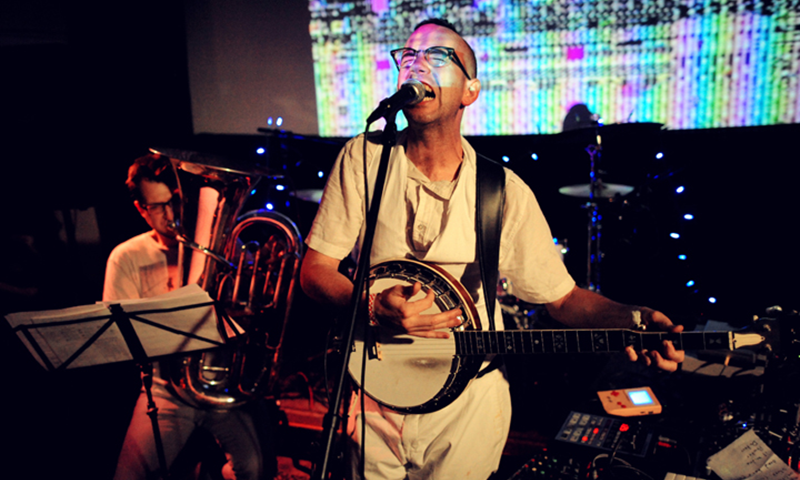One sound that captures the dual nature of Rockage’s programming is a musical movement Fanali characterizes as “digital punk rock”: chiptune, a style united by artists who use modified game systems to manipulate sounds created on the original Nintendo Entertainment System (NES) or Nintendo’s first portable gaming device, the Game Boy.
“I think right now, chiptune is really an aesthetic more than anything,” explains Morgan Tucker, who utilizes elements of the sound as part of his project crashfaster. He’s also the founder of 8bitSF, which hosts a monthly chiptune party at DNA Lounge in San Francisco.
The limited capability of the dated technology, coupled with the low cost of entry – Tucker says one can start making chiptune music for under $100 – has made it a wide-open space for creativity. That’s what attracted Oakland composer and multi-instrumentalist Matthew Joseph Payne, who returns to Rockage to perform with his group the Mineral Kingdom.
“I think that there’s a lot to say for self-imposed limitations and restrictions as part of the compositional process. I know that’s a big part of it for me. At least it was when I started out,” Payne explains. “Now, I’ve done it for so long that it’s more about a very specific instrument that I’m very comfortable with.”
The different styles of the Mineral Kingdom and crashfaster help highlight Tucker’s point about chiptune as an aesthetic choice more than a unified sound. Crashfaster is rooted more in electro, likely stemming from Tucker’s interest in electronic and industrial music. Payne is a working composer, constantly delivering unlikely musical pairings with fascinating results.
Likewise, the unlikely pairings at the event aim to inspire open exploration of new fascinations, whether it’s a tournament gamer coming across a band they enjoy or a music junkie stumbling upon an old favorite console. To Eric Fanali, that’s what it’s all about.
“If it’s one thing I do in my lifetime,” he starts, before stopping to firmly snap his fingers and knock on wood, it’s to “connect as many people as possible, because if I can’t do something great, they can together.”
One such connection takes place Saturday, when Payne takes the stage with A/B Duo. A/B Duo member Meerenai Shim, who also plays flute in Mineral Kingdom, commissioned a piece from Payne meant to sound like a video game score. During their set, A/B Duo will perform Payne’s composition while he plays a video game that Shim, in turn, designed to go along with the score. It’s a moment that could only happen at Rockage.
One aspect of the event’s new connection to San Jose State is the involvement of SJS’s Game Development Club. Gamers get the chance to see students’ game design at work, beautifully on display in custom-made arcade cabinets, but it’s also an opportunity for the design students, as Rockage gives them a chance to watch the public react to the worlds they’ve created.
“We’re being put on the same level as both the indie developers that show up at Rockage and the professional cabinets that sit in the arcade room,” says James Morgan, faculty advisor for the club. “It’s all kind of a level playing field, and I think that does a lot to help the students. That makes them work a little bit harder because they really want to shine in that space.”
Several people involved with Rockage say this unifying spirit—a tone set by Fanali—is contagious, and what makes the festival feel so casual and welcoming.
Tucker’s final words seem to capture that community spirit, echoed by all interviewed. “To be honest with you,” he says, “I’m most excited to see all my friends.”


